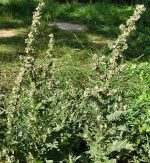 Native to saline and alkaline deserts of central and southern Europe to western and eastern Asia, this annual shrub is a member of the Amaranthaceae family that also includes spinach, beet, and celosia. It grows up to 5′ tall, is much branched and forms a tangled or spreading mass with branches sometimes horizontal on the ground. The alternate leaves are .6-2″ long, obvate to triangular, and have variable sinuate-dentate margins. Clusters of small inconspicuous male and female flowers are carried on the same plant from mid summer into fall. The staminate flowers are in terminal, leafless, spike-like inflorescences while 3-20 pistillate flowers are whorled together in the leaf axils. Photo Credit: Gabriele Kothe Heinrich Wikipedia
Native to saline and alkaline deserts of central and southern Europe to western and eastern Asia, this annual shrub is a member of the Amaranthaceae family that also includes spinach, beet, and celosia. It grows up to 5′ tall, is much branched and forms a tangled or spreading mass with branches sometimes horizontal on the ground. The alternate leaves are .6-2″ long, obvate to triangular, and have variable sinuate-dentate margins. Clusters of small inconspicuous male and female flowers are carried on the same plant from mid summer into fall. The staminate flowers are in terminal, leafless, spike-like inflorescences while 3-20 pistillate flowers are whorled together in the leaf axils. Photo Credit: Gabriele Kothe Heinrich Wikipedia
The Hebrew word מַלּ֣וּחַ and is often translated as mallows because of the similarity of the Hebrew word to the Greek word malache (implying salty), from which the Latin malva and English “mallow” are derived. It is not related to the plant we ordinary call mallow, Malva sp. Most authorities believe that a kind of saltbush, Atriplex, is intended. Twenty one kinds of saltbush are found in the Holy Land and any one of them could be the plant intended. Although Atriplex halimus is the most probably species, other possibilities include tatarian orachea (A. tatarica), A. dimorphostegia, and tumbling saltbush (A. rosea).
Job 30.4 (NKJV) Job bemoans his miserable plight by describing the very poor food that is eaten by the lowly, unworthy people that are now his tormentors.
“Who pluck mallow by the bushes, And broom tree roots for their food.”
Tatarian orachea likes full sun and average to lean, medium moist, well-drained but tolerates drought and very alkaline and saline soil. Propagation is by seed. The leaves and plants are sometimes eaten as emergency food during desperate times and the seeds may be ground and used as a thickener in bread making. Plants may be a source of potash and are medicinally useful but are often considered invasive where introduced.
The genus name, Atriplex, is the Greek name for orach, a related plant that can be used as spinach. The specific epithet, tatarica, is the new Latin word meaning of Central Asia, and refers to the geographic distribution of the plant.